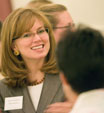 David Chu, director of the Ciocca Office of Entrepreneurial Studies, knew that the inaugural Women in Business Conference held at Holy Cross in October of last year would be popular, but he didn’t know just how popular.
David Chu, director of the Ciocca Office of Entrepreneurial Studies, knew that the inaugural Women in Business Conference held at Holy Cross in October of last year would be popular, but he didn’t know just how popular.
An e-mail sent to Holy Cross alumnae across the Northeast months before the event elicited an enthusiastic response.
“We had originally thought we would get 40 responses from alumnae. Those 40 seats were filled up in one day. It was sent at 10 o’clock on a July morning and by the end of that day, more than 40 people had signed up — and this was peak vacation time!”
In the end, Chu was able to accommodate almost all of the more than 130 alumnae who were interested in attending.
“The purpose of the conference is for women in business, or — in the case of students —interested in business, to learn something new and to network,” he says. “The reaction from alumnae was a testament to the need for more networking opportunities for women.”
Last year’s conference was largely a celebration — marking 30 years of Holy Cross women in the business world. The first women students entered Holy Cross in 1972. (That group consisted of 29 sophomores and juniors who had transferred from other schools as well as 244 freshmen.) Last year marked the anniversary of the first four-year class of women who graduated in 1976. At the conference, four keynote speakers and panelists, representing Holy Cross graduates from the 1970s, 1980s, and 1990s addressed the participants.
After suggestions from last year’s participants, the theme to this year’s conference on Oct. 26 and 27 will be “Integrating Savvy and Integrity for Success.” The keynote speaker will be Mary Ann Rettig-Zucchi ’76, principal consultant at Jupiter Consulting Group. Through her presentation, titled “Organizational Savvy: Avoiding Political Blind Spots, Increasing Impact and Maintaining Integrity,” she will help participants develop an understanding of various political styles within organizations, as well as practical strategies for working with “overly-political” colleagues or bosses.
Rettig-Zucchi agrees with Chu that these conferences are extremely important for women in business.
“The many highly accomplished alumnae business leaders attest to the significant contributions that well-educated, capable women make to business,” she says. “Sadly, a great deal of that potential remains untapped. Based on their 2006 consensus, Catalyst [a non-profit organization working to advance opportunities for women and business] reports that ‘even though women make up over 50% of the management, professional, and related occupations, only 15.6% of Fortune 500 corporate officers and 14.6% of Fortune 500 board directors are women.’ The Catalyst research found that men are still viewed as ‘default leaders’ and women as ‘atypical leaders,’ with the perception that they violate accepted norms of leadership, no matter what the leadership behavior.”
She continues, “In addition to the limitations springing from misconceptions, women frequently report that their influence is thwarted by limited access to vital communication networks in their organizations. Businesses benefit when women are attuned to these challenges and capably equipped to overcome them. This conference offers a wonderful opportunity for students and alumnae to better understand the realities for women in business, learn from one another and build their professional networks.”
Rettig-Zucchi is looking forward to empowering this new generation of Holy Cross women students before they enter the business world.
“One of the most common comments I hear from seasoned business leaders in the Organizational Savvy programs I conduct in major corporations is ‘I wish I had this 20 years ago — my career would be in a different place!’ I hope that students will realize they can — and indeed must — enter the arena of inevitable organizational politics without sacrificing their integrity. Similarly, I look forward to prompting alumnae to expand the ways in which they can have influence in their jobs, impact in their organizations and develop their careers while remaining true to their values.”
“The conference is even more important at a liberal arts college like Holy Cross,” says Chu.
“People in business benefit from a liberal arts education background because they can see the world in a holistic way — beyond their specific area of professional expertise,” he says. “Yet liberal arts students also need to acknowledge the reality of the professional world beyond Holy Cross. What better way than to connect them with alumnae who are in the business world?”
The Women in Business Conference is only one of many programs developed by Chu to reach out to alumnae. A golf workshop was held in Stow, Mass., last month to help alumnae take advantage of the unique business tool, and a wine tasting and networking event was held in Manhattan in early October.
“Ultimately, I would like to see Holy Cross women and their successes recognized at the same level with Wellesley, Smith, Pomona, Harvard, and other schools that boast so many women business leaders,” he said. “While this program is in its infancy today, I see Holy Cross moving toward having a seat at that table.”
Pictured: Sheila Cavanaugh ’81, senior vice president at Fidelity Investments, at last year’s Women in Business Conference.
Networking top priority of Women in Business Conference
Moving on Up
Read Time
4 Minutes
